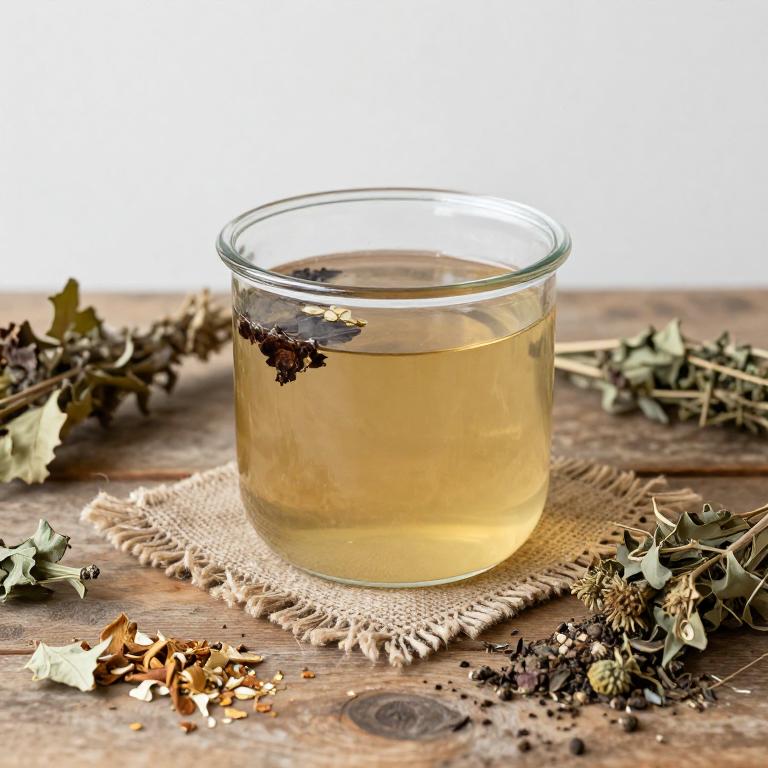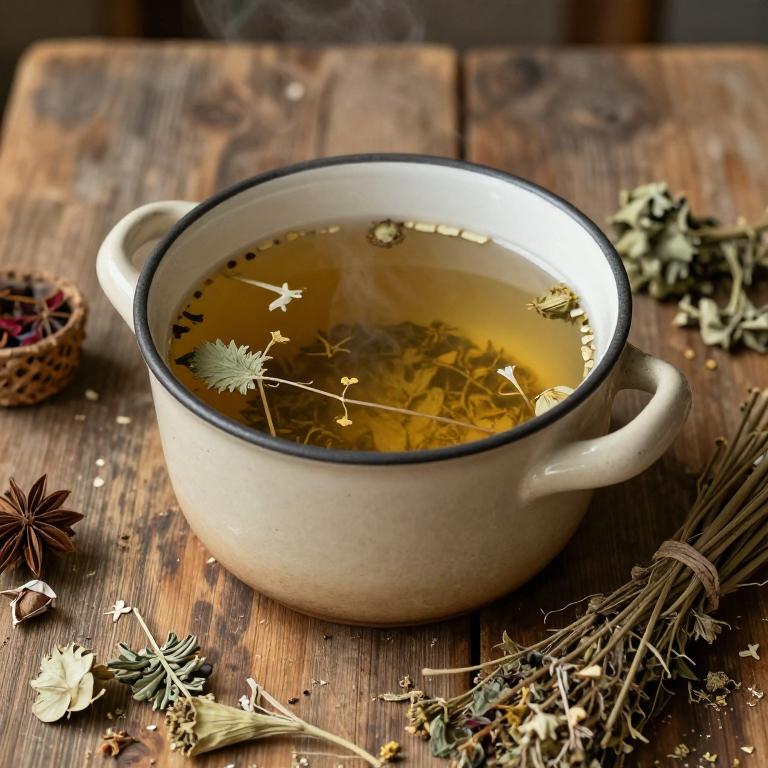10 Best Herbal Decoctions For Burping

Herbal decoctions for burping are traditional remedies that utilize specific plants to help reduce excessive gas and improve digestion.
Commonly used herbs include ginger, fennel, and peppermint, which are known for their soothing and carminative properties. To prepare a decoction, these herbs are typically simmered in water for an extended period to extract their active compounds. Drinking the decoction after meals can aid in relieving bloating and preventing burping by promoting better gastrointestinal function.
While generally safe, it is advisable to consult a healthcare professional before using herbal remedies, especially for prolonged periods or in combination with other medications.
Table of Contents
- 1. Fennel (Foeniculum vulgare)
- 2. Peppermint (Mentha piperita)
- 3. Cumin (Cuminum cyminum)
- 4. Thyme (Thymus vulgaris)
- 5. Stinging nettle (Urtica dioica)
- 6. Dog rose (Rosa canina)
- 7. Parsley (Petroselinum crispum)
- 8. Rosemary (Rosmarinus officinalis)
- 9. Ginger (Zingiber officinale)
- 10. Black pepper (Piper nigrum)
1. Fennel (Foeniculum vulgare)

Foeniculum vulgare, commonly known as fennel, has been traditionally used in herbal medicine to aid in the relief of burping.
Its essential oils, particularly anethol and fenchone, are believed to have carminative properties that help expel gas from the digestive tract. A fennel herbal decoction is typically prepared by simmering the dried seeds in water for several minutes, allowing the active compounds to infuse into the liquid. This decoction can be consumed warm to soothe the stomach and reduce bloating associated with frequent burping.
While generally considered safe, it is advisable to consult a healthcare provider before using fennel, especially for individuals with allergies or existing medical conditions.
2. Peppermint (Mentha piperita)

Mentha piperita, commonly known as peppermint, is often used in herbal decoctions to alleviate symptoms of burping.
The essential oils in peppermint leaves have antispasmodic properties that can help relax the muscles in the digestive tract, reducing the frequency of burping. To prepare a peppermint herbal decoction, fresh or dried peppermint leaves are steeped in hot water for several minutes. This soothing remedy is particularly beneficial for individuals experiencing burping due to gastrointestinal discomfort or acid reflux.
While generally safe, it is advisable to consult a healthcare professional before using peppermint decoctions, especially for those with certain medical conditions or taking medications.
3. Cumin (Cuminum cyminum)

Cuminum cyminum, commonly known as cumin, has been traditionally used in herbal medicine for its digestive benefits, including the relief of burping.
When prepared as a decoction, cumin is boiled in water to extract its essential oils and active compounds, which can help reduce excess gas and bloating in the stomach. The warming properties of cumin may stimulate digestion and promote the expulsion of trapped air, making it a popular remedy for burping. To prepare the decoction, a teaspoon of cumin seeds is typically simmered in a cup of water for about 10 minutes before being strained and consumed.
Regular use of cumin decoction may support overall digestive health and alleviate discomfort associated with frequent burping.
4. Thyme (Thymus vulgaris)

Thymus vulgaris, commonly known as thyme, is a herb widely used in traditional medicine for its various therapeutic properties.
Herbal decoctions made from thymus vulgaris are often prepared by simmering the dried leaves and flowers in water to extract their essential oils and active compounds. These decoctions are believed to aid in digestion and may help alleviate symptoms such as burping by reducing excess gas and improving gastrointestinal motility. The antimicrobial and anti-inflammatory compounds in thyme can also soothe the digestive tract, potentially reducing the frequency of burping.
While thyme decoctions are generally considered safe, it is advisable to consult a healthcare professional before using them, especially for individuals with pre-existing medical conditions or those taking medications.
5. Stinging nettle (Urtica dioica)

Urtica dioica, commonly known as stinging nettle, has been traditionally used in herbal medicine for its various health benefits, including its potential to aid in digestive issues such as burping.
When prepared as a herbal decoction, stinging nettle is typically simmered in water for an extended period to extract its active compounds, which may help reduce excess gas and bloating in the stomach. The decoction is believed to support the digestive system by promoting healthy gastrointestinal motility and reducing inflammation. However, it is important to note that individuals should consult with a healthcare professional before using stinging nettle, especially if they have existing health conditions or are taking medications.
While some people report relief from burping after using nettle decoctions, more scientific research is needed to fully understand its efficacy and safety in this context.
6. Dog rose (Rosa canina)

Rosa canina, commonly known as rosehip, has been traditionally used in herbal medicine for its rich content of vitamins, antioxidants, and anti-inflammatory compounds.
Herbal decoctions made from Rosa canina are often prepared by simmering the dried fruits in water to extract their beneficial properties. These decoctions are believed to support digestive health and may help alleviate symptoms such as burping by promoting the elimination of excess gas from the gastrointestinal tract. The mild, warming nature of rosehip decoctions can also soothe the stomach and reduce bloating.
While not a cure-all, Rosa canina herbal decoctions are a gentle and natural remedy that may complement other strategies for managing burping and digestive discomfort.
7. Parsley (Petroselinum crispum)

Petroselinum crispum, commonly known as parsley, has been traditionally used in herbal medicine for its digestive benefits, including the relief of burping.
The leaves and seeds of this plant contain compounds that may help reduce excess gas and promote healthy digestion. A decoction made from dried parsley can be prepared by simmering the herb in water for several minutes to extract its beneficial properties. This herbal remedy is often recommended for individuals experiencing frequent burping due to indigestion or dietary factors.
While it is generally safe, it is advisable to consult a healthcare professional before using parsley decoctions, especially for prolonged periods or in combination with other medications.
8. Rosemary (Rosmarinus officinalis)

Rosmarinus officinalis, commonly known as rosemary, is a herbal plant often used in traditional medicine for its aromatic and therapeutic properties.
Rosemary herbal decoctions, made by simmering the leaves in water, are believed to aid in digestion and reduce symptoms of burping by promoting the release of excess gas from the stomach. The essential oils in rosemary, such as cineole and camphor, have anti-inflammatory and carminative effects that may help soothe the digestive tract. Some studies suggest that rosemary can stimulate the production of digestive enzymes, which can improve overall digestion and reduce the occurrence of burping.
However, it is recommended to consult a healthcare professional before using rosemary decoctions, especially for individuals with existing health conditions or those taking medications.
9. Ginger (Zingiber officinale)

Zingiber officinale, commonly known as ginger, has been widely used in traditional medicine for its digestive benefits, including the relief of burping.
Herbal decoctions made from fresh or dried ginger root are often prepared by boiling the rhizome in water to extract its active compounds, such as gingerols and shogaols. These compounds are known to reduce gas and soothe the gastrointestinal tract, making ginger decoctions an effective remedy for excess burping. The warming properties of ginger also help to alleviate indigestion and nausea, which are common causes of burping.
Regular consumption of ginger decoctions in moderate amounts can provide natural and soothing relief for individuals experiencing frequent burping.
10. Black pepper (Piper nigrum)

Piper nigrum, commonly known as black pepper, has been traditionally used in herbal medicine for its potential digestive benefits.
Herbal decoctions made from black pepper are often prepared by simmering the dried berries in water to extract their active compounds, such as piperine. These decoctions are believed to aid in reducing bloating and burping by stimulating digestive enzymes and improving gastrointestinal motility. The piperine in black pepper may also enhance the absorption of other nutrients, supporting overall digestive health.
However, while some people find relief from burping using black pepper decoctions, it is advisable to consult a healthcare professional before using it as a remedy, especially for persistent or severe symptoms.